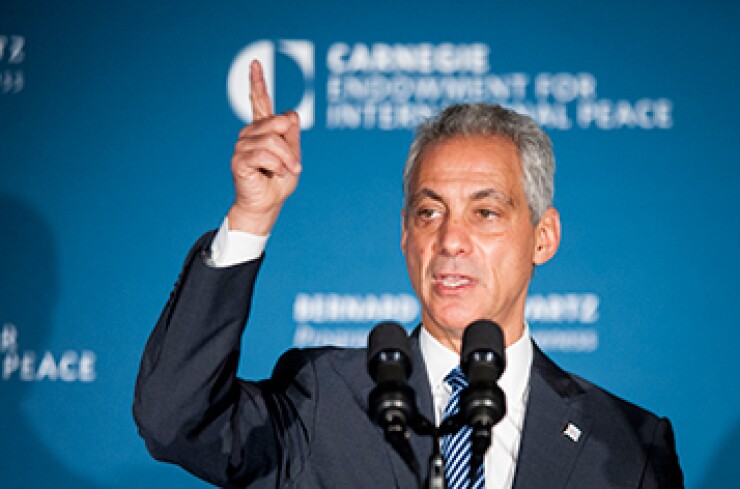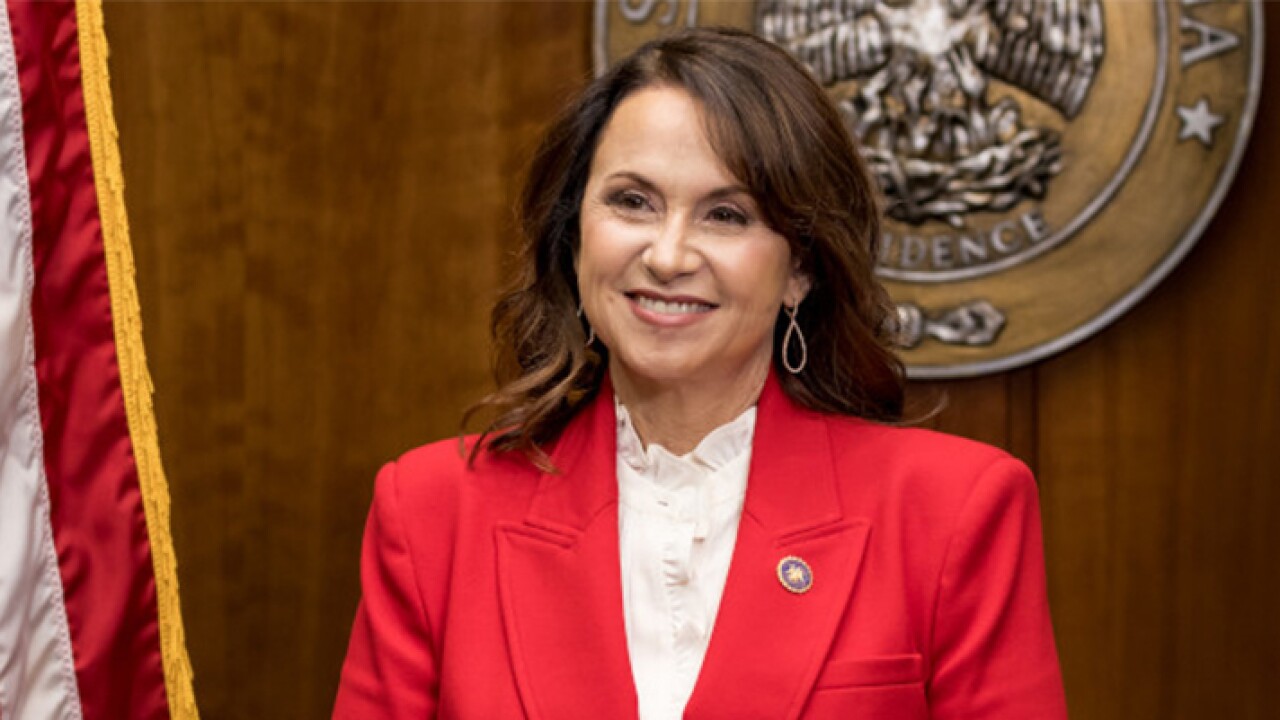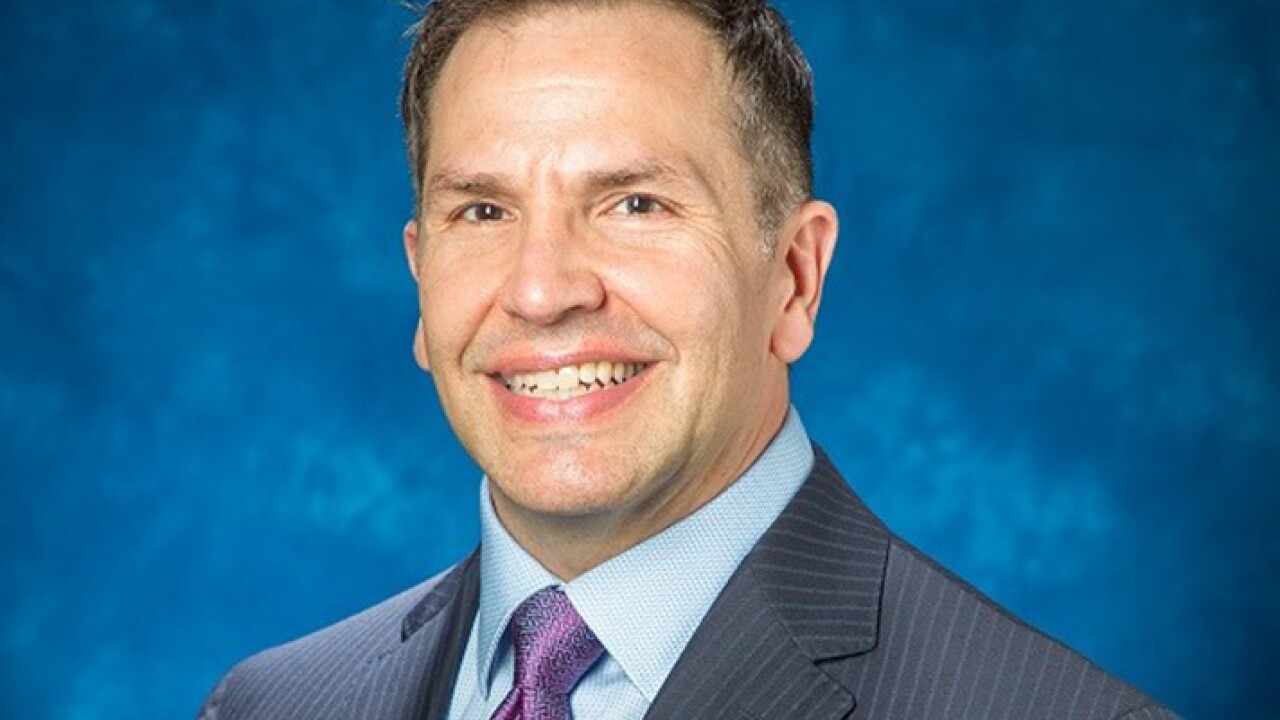
CHICAGO – Chicago plans a tax on water and sewer services to save its largest pension fund from insolvency, Mayor Rahm Emanuel announced Wednesday.
The tax would rise incrementally over five years to reach $239 million annually, with the revenue used to cover higher contributions to the municipal employees' pension fund.
At the end of the ramp, the city would reach an actuarially based contribution level designed to hit a 90% funded ratio in 2057. It resembles plans in place for the city's police and firefighter funds and one proposed for the laborers' fund. The city would also dip into general fund and enterprise funds to help cover higher contributions.
"This agreement represents an incredible milestone on the road to financial recovery," Emanuel said. "For the first time in a very long time, every single one of our pension funds is on a path to financial security."
Emanuel unveiled the proposed fix for the municipal fund in his address to investors at the city's annual investor conference.
The city's 2016 contribution to the fund is $162 million and without changes the fund will become insolvent in 2025, after which payments would jump to more than $1 billion to meet obligations on a pay-as-you-go basis.
The city has authority to levy the tax based on its home rule status, so no state legislative approval is needed, but the City Council must sign off.
Investors asked Wednesday about local political support for the latest pension-related tax hike and Emanuel expressed confidence that the council would "finish the job" and "step up" to resolve the funding woes of all four funds.
While the tax can be approved locally, the state legislature must vote to overhaul the pension's funding scheme, because the current arrangement is set in statute. Emanuel said Wednesday the city would submit legislation for both its municipal and laborers' plans during the General Assembly's traditional fall veto session.
The laborers' pension plan relies on an already approved 9-1-1 surcharge. Increased payments to the police and firefighters' funds are being covered by a $543 million increase in the property tax levy that also is being phased in through 2020.
Emanuel won legislative approval to ease what was a higher public safety pension spike owed this year under a 2011 state mandate. Gov. Bruce Rauner vetoed the legislation but lawmakers overrode the veto earlier this year.
Like the proposed laborers' overhaul, the proposal increases contributions by 3% for new hires and lowers the age of eligibility for full benefits from 67 to 65 for any new employee hired on or after Jan. 1, 2017. Employees that fall into what's known as "tier two" established back in 2011 will be asked if they want to increase their contributions by 3% in exchange for a lower eligibility age of 65 for full benefits in exchange for increasing their payroll contributions by 3%.
Current employees and retirees won't see any change. The city previously had pursued reforms that cut benefits for laborers' and municipal fund employees but the Illinois Supreme Court voided those cuts earlier this year concluding they violated state constitutional protections. The high court's rulings on the city and previously on state reforms severely limited the city's options going forward.
Under the tax proposal, the city would impose the tax on water-sewer usage used by businesses and residential properties beginning next year. The tax equates to $0.59 per 1,000 gallons based on their water and sewer usage and will cost residents on average $4.43 more monthly in 2017, raising about $56 million. In 2020, the rate reaches $2.51 per 1,000 gallons of water and sewer usage, when it is expected to generate $239 million annually.
The current water/sewer charges generated about $1.1 billion last year.
The tax doesn't run afoul of covenants tied to the city's water and wastewater bonds because it doesn't directly impact water and sewer rates that secure the bonds, said city finance department spokeswoman Molly Poppe.
The city has $2.8 billion of water revenue bonds and $1.5 billion of wastewater bonds. The city has phased in steep rate increases to speed up capital projects, but said rates are below average in the area. Officials compare them to a handful of nearby suburbs that charge rates more than double what Chicago imposes.
The average Chicago homeowner currently pays between $600 and $700 annually. Once phased in, the new utility tax would raise rates on average by about 28%.
The size of the ramp-up contribution plan is not yet final, but the city said city contributions would rise by no less than 30% annually over the next five years and then by $20 million to $30 million annually. Higher contributions will also be covered from enterprise funds and the city's general fund.
The municipal fund, which has about 70,000 members, saw its unfunded liabilities rise by $2.5 billion in 2015 to $9.8 billion. They account for $18.6 billion – up from $7.1 billion in 2014 -- of the city's $33.8 billion of net pension liabilities under new accounting rules. Under those rules, the four pension funds are collectively funded at just a 23% ratio.
The city's unfunded pension tab has dragged its ratings down, leaving it with one junk rating and at risk of another if it can't stabilize its pension strains. The city's GOs are rated Ba1 by Moody's Investors Service and BBB-plus by Kroll Bond Rating Agency and S&P Global Ratings. Fitch Ratings has the city at the lowest investment grade level of BBB-minus.
While winning praise for moving to tackle its pension ills, analysts have been critical Chicago for proposing plans that will take decades to improve funding levels.





